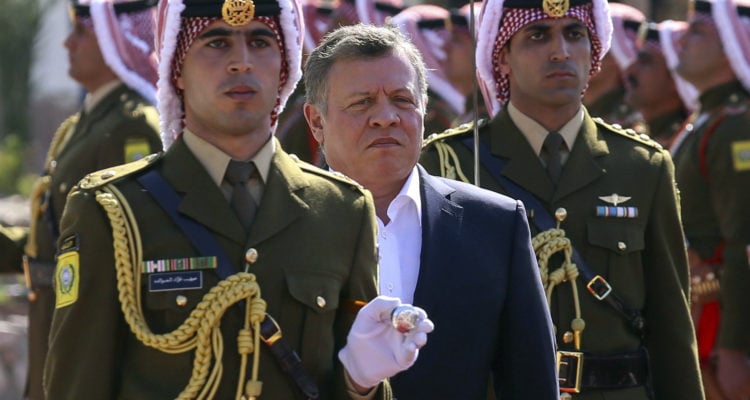The Trump peace plan will spell Jordan’s demise by turning it into a Palestinian state, Jordanians say.
By World Israel News Staff
There is fear in Jordan that the Trump peace plan will spell the country’s demise by turning it into a Palestinian state, Agence France-Presse reports.
Oraib Rintawi, head of the Al-Quds Center for Political Studies in Amman, said “Jordan is worried because the deal ignores the idea of an independent Palestinian state.”
“This will mean that the sustainability of a Palestinian nation would be conditioned to it being linked somehow with Jordan and that will open the gates of hell for Jordan,” he said, according to AFP.
Trump administration officials leading Middle East peace efforts have signaled that a Palestinian state may not be the end goal of the agreement they have been working on, although political details of the deal have yet to be released.
In June, when President Donald Trump’s son-in-law and senior adviser Jared Kushner was asked whether Palestinians were capable of governing themselves, he said “that’s one that we’ll have to see. The hope is that they, over time, will become capable of governing.”
He said that Palestinians first “need to have a fair judicial system… freedom of press, freedom of expression, tolerance for all religions.”
In May, Kushner had said that the administration is avoiding using terms like ‘two-state solution.’
“If you say ‘two-state’, it means one thing to the Israelis, it means one thing to the Palestinians We said, ‘you know, let’s just not say it. Let’s just say, let’s work on the details of what this means,’” he said.
Such talk frightens Jordan’s leadership, which interprets such language as meaning there won’t be a Palestinian state but instead some kind of confederation with Jordan.
That means Jordan would be forced to allow in more Palestinians. “This is a nightmare,” Rintawi said.
Jordan’s population is 9.5 million people, half of whom are of Palestinian origin. Two thirds of those hold Jordanian citizenship. The others are considered refugees, “who many Jordanians fear will be settled permanently and given citizenship as well if the Kushner plan goes through,” AFP reports.
The kingdom is ruled by the Hashemites, whose family originated in Saudi Arabia. In the past, the royal family has relied on Bedouin tribes (who see themselves as “kingmakers” and “pillars of the state”) for its stability.
However, there are signs that Bedouin loyalty is being undermined as economic pressures impact employment for public sector employees, many of which go to the ‘indigenous’ Bedouin.
The country suffers from ongoing inflation, roughly $30 billion in national debt and a 40 percent youth unemployment rate. The country receives $1 billion from the U.S. yearly. That accounts for 70 percent of Jordan’s foreign aid, but as Al Jazeera reports, “much of that is now ‘on hold,’ pending Jordan’s acquiescence to the so-called Deal of the Century.”
A confederation that would include parts of Judea and Samaria, adding possibly millions of Palestinians to the country’s population, would add additional pressure, Jordanians fear.
“It would mean the end of the Palestinian cause and it would wipe out Jordanian identity, both in one go,” Jordanian Khaled al- Khrisha told AFP as he protested outside the U.S. Embassy in Amman in June.
“Jordan will be the biggest loser after the Palestinians,” he said.
Jordan’s leadership would like to see a political solution that includes a Palestinian state with a “right of return,” meaning Palestinian refugees could return to places they claim as their former homes in Israel – something that Israelis from both sides of the political aisle agree would spell the end of the Jewish state.
“No economic proposal could replace a political solution that ends the occupation,” Jordan’s foreign ministry spokesman Sufyan al-Qudah told AFP.
“Forfeiting the right of return and compensation (for refugees) will be dangerous for Jordan and the Palestinians,” Ahmad Awad, head of the Amman-based Phenix Center for Economics and Informatics Studies, said, according to the report.





